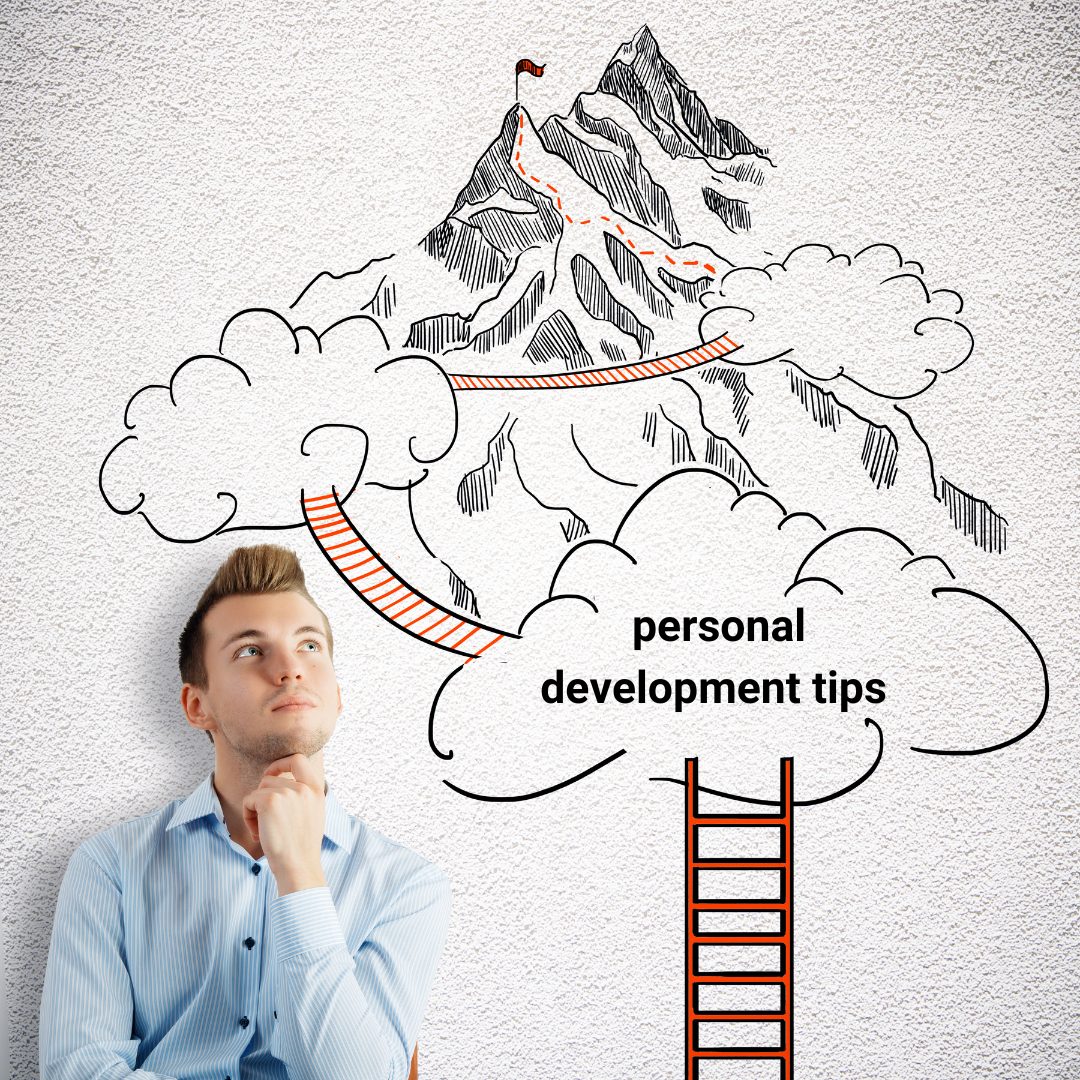Personal Development Tips: Personal development is an ongoing process of self-improvement that involves expanding your knowledge, skills, and experiences for both personal and professional growth. It’s about taking proactive steps to better yourself, setting goals and objectives that give you direction, and working on developing effective habits that contribute to your success. This path of development benefits not just your professional life but also improves your overall life quality.

To embark on a path of personal development, it’s important to establish clear objectives and define what success means to you. Whether it’s cultivating stronger relationships, enhancing your emotional intelligence, or improving your physical and mental well-being, each aspect contributes to building a more resilient and adaptable you. Engaging in lifelong learning, practicing mindfulness, and reflecting on your progress are integral parts of this holistic approach to self-improvement. Importantly, personal development also involves taking personal responsibility for your actions and decisions, constantly seeking ways to improve, and being open to change.
Key Takeaways
- Establishing specific goals increases clarity and guidance in your journey of personal growth.
- Effective habits and continuous learning are fundamental for growth and success.
- Emotional intelligence and resilience contribute significantly to personal and professional fulfillment.
Setting Goals and Objectives

On the path to personal and professional development, having clear goals and actively pursuing them is crucial. Understanding the process of goal-setting and creating a structured development plan can significantly influence your success.
Understanding Goal-Setting Theory
Goal-setting is an essential component in the process of achieving personal and professional growth. According to Locke and Latham’s principles of effective goal setting, goals must be clear, challenging, attainable, and accompanied by continuous feedback. Clarity ensures that you comprehend what is to be achieved, while challenge maintains motivation. Commitment to goals, especially when they are complex, requires a determination to persevere, and feedback provides a means to track progress and make necessary adjustments.
Creating a Personal Development Plan
A personal growth plan serves as your blueprint for advancement. Begin by outlining your vision and establishing SMART (Specific, Measurable, Achievable, Relevant, and Time-bound) objectives that resonate with your values and dreams. Your PDP should outline:
- Your current state (skills, experiences, and knowledge)
- Your end goals (the specific outcomes you’re striving for)
- Actionable steps (the path you will take to reach your goals)
- Resources required (what you will need in terms of time, support, and materials)
- Review processes (how often you will reflect on and revise your plan)
Identifying Personal and Career Aspirations
Your personal and career aspirations should drive your goal-setting process. Prioritize your goals based on what is most important to your vision and what can serve as a stepping stone toward larger objectives. Focus on establishing priorities that not only contribute to your career development but also align with your personal values and life goals.
Developing Effective Habits

Personal development hinges on the establishment of effective habits that support your growth goals. By integrating healthy routines and habit tracking into your life, you can foster significant improvements in your productivity and time management.
Incorporating Healthy Routines
Your daily routine lays the foundation for self-improvement. Establish a growth mindset by starting your day with exercises such as meditation or yoga, which enhance both physical and mental health. Nutrition also plays a crucial role; start integrating habits such as drinking water as the first thing in the morning and opting for nutritious meals.
Time management is pivotal in integrating these habits into your lifestyle. Plan your schedule to include blocks of time for skill development and personal reflection. This ensures continuous learning and accountability. For example, set aside time weekly to review goals and adapt as necessary.
The Power of Habit Tracking
To solidify your new habits, habit tracking is an invaluable tool. This practice creates a visual representation of your consistency and progress. Use a simple tracker to record your activities such as the “two-minute rule” for starting new habits, as suggested by James Clear.
Review your tracker regularly to identify patterns and make necessary adjustments. Celebrate the wins and understand the misses to foster your personality development skills. Remember, this is a catalyst for maintaining a responsible outlook on your personal growth journey.
Learning and Intellectual Growth

Learning and intellectual growth are pivotal components of your personal development journey. It involves enhancing your knowledge base, skillset, and cognitive abilities, which can open new doors and present various challenges that contribute to your personal and professional life.
Fostering a Love for Learning
Encourage a passion for learning by engaging with material that intrigues and challenges you. Find joy in the journey through reading diverse topics and communicating your insights with others. By nurturing curiosity, you lay the groundwork for a robust personal skill set.
- Creativity: Integrate creative activities into your routine to stimulate your mind.
- Challenges: Don’t shy away from difficult subjects; embrace them as growth opportunities.
Pursuing Further Education and Skills
Keep your professional edge sharp by pursuing further education and developing new skills. Whether it’s formal coursework or online workshops, any form of structured learning can significantly impact your capabilities.
- Personal Skills: Improve communication skills and enhance problem-solving abilities through targeted learning experiences.
- New Skills: Attend seminars or webinars that focus on expanding your skillset specific to your interests or career.
By actively engaging in learning and education, you become better equipped to tackle professional challenges and personal ambitions.
Building Emotional Intelligence
Building Emotional Intelligence is a key factor in personal and professional success. It involves honing a keen sense of self-awareness and mastering the art of emotion-regulation. These skills enable you to navigate social complexities with greater ease and make more informed decisions. These skills empower you to navigate social complexities more effortlessly and make better-informed decisions.

Developing Self-Awareness
Understanding your emotions begins with developing self-awareness. This involves recognizing feelings as they occur and grasping the connection between your emotions and your actions.
- Keep a journal: Recording your thoughts can reveal patterns in your emotional responses.
- Mindfulness practice: Regular mindfulness can enhance your awareness of the present moment, allowing you to identify your feelings more clearly.
To enhance the development of self-awareness, take time to ponder questions like, “How do my emotions impact my decisions?” or “What stimuli provoke strong emotional reactions within me?”To further aid in developing self-awareness, consider reflecting on questions such as, “How do my emotions affect my decisions?” or “What triggers strong emotional reactions in me?”
Improving Emotion-Regulation
Effective emotion-regulation is crucial for using your emotional intelligence in a constructive manner. Regulating your emotions doesn’t mean suppressing them, but rather understanding how to respond to them appropriately.
- Breathing exercises: Simple yet powerful, controlled breathing can act as a self-soothing mechanism.
- Relaxation techniques: Practices like progressive muscle relaxation can assist in reducing your overall tension and stress levels.Relaxation techniques: Techniques such as progressive muscle relaxation can help lower your overall tension and stress levels.
By applying these strategies, you are better equipped to handle stress, maintain your composure in challenging situations, and react to emotional stimuli in a balanced way. Remember, the goal is to recognize your emotions and choose your response, rather than letting your emotions dictate your actions.
Enhancing Social and Relationship Skills

Developing your social skills is integral to fostering healthy personal relationships, which rely on effective communication, empathy, and trust. Whether you’re engaging in casual social interactions or aiming to cultivate long-lasting relationships, honing these skills can lead to more fulfilling connections.
Cultivating Positive Relationships
To build positive relations, it is vital to understand and practice empathy. Empathizing by putting yourself in someone else’s shoes facilitates a deeper connection and fosters trust. Focus on:
- Active listening: Truly listen when people speak, which shows that you value their perspective.
- Appreciation: Regularly express gratitude to reinforce the value of the relationship.
Trust forms the foundation of any healthy relationship. By being reliable, consistent, and honest in your interactions, you’ll be more likely to develop and maintain positive relations.
Learning through social interaction.
The Social Learning Theory posits that individuals learn from one another through observation, imitation, and modeling. You can enhance your social skills by:
- Observation: Pay attention to social cues and adapt accordingly.
- Imitation: Mirror the positive aspects of the interactions you observe.
- Modeling: Be a role model for positive communication and interaction.
Remember, the development of your social skills is a dynamic process that benefits greatly from social interactions. Regularly engaging with others and reflecting on your experiences are key to continuous improvement.
Fostering Resilience and Adaptability

Building resilience and adaptability requires a proactive approach to tackling life’s challenges. By acknowledging your strengths and weaknesses, you can rest assured that you’re equipped with the self-confidence to manage adversity and pivot when necessary.
Overcoming Challenges and Setbacks
To effectively overcome challenges, it’s essential to identify your specific sources of resilience and leverage them. For instance, consider these resilience needs and how you might cultivate them:
- Self-confidence: Trust in your abilities and remind yourself of past successes.
- Positivity: Maintain an optimistic outlook by focusing on solutions rather than obstacles.
Developing problem-solving skills and setting goals are essential. When facing setbacks, break down large problems into manageable tasks. This will assist you in navigating difficult situations with a clearer mind.
Engage with your support network and seek input when you’re caught in a bind. Remember, seeking help demonstrates your strength in acknowledging when you need support. Embrace change, as it’s a natural aspect of life and a chance for personal growth.
Staying Positive in Adversity
Positivity in adversity doesn’t mean ignoring the tough emotions that come with hardship. It means acknowledging them and then consciously directing your focus towards hope and optimism.
- Maintaining a positive outlook: Counter negative thoughts with evidence of your capabilities.
- Finding purpose: Align your actions with your core values, which can act as a compass during tough times.
Incorporate strategies like mindfulness and gratitude to keep a healthy perspective. Adopting an optimistic viewpoint helps in framing adversity as a temporary and surmountable state. Remember, your adaptability shines when you remain steady in the winds of change while keeping your eyes on the horizon.
Promoting Health and Well-Being

To enhance your well-being, it’s essential to focus on nutrition and sleep, as well as engage in regular exercise. These components are vital in improving both your physical health and mental wellness.
Understanding the Role of Nutrition and Sleep
Alongside a nutritious diet, sleep is a fundamental component of self-care. Strive for 7 to 9 hours of restful sleep each night to allow both your body and mind to recover fully. Implementing a calming bedtime routine can lead to improved sleep and better mental health.
The Benefits of Regular Exercise
Exercise is another cornerstone of health and well-being. Regular physical activity boosts your mood, increases energy levels, and can have a long-term positive impact on your mental health. Experts suggest participating in a minimum of 150 minutes of moderate aerobic exercise or 75 minutes of intense activity weekly, alongside muscle-strengthening workouts at least two days per week.
By incorporating consistent exercise into your routine, you nurture your body and mind, paving the way for a healthier wellbeing. Whether it involves taking a quick-paced walk, riding a bicycle, or practicing yoga, discover an activity that brings you joy and incorporate it into your lifestyle.
Cultivating Mindfulness and Self-Reflection
In your journey of personal development, it is essential to adopt strategies that enhance both your mindfulness and self-reflection, leading to greater self-awareness and improved emotional skills. These practices help you attain a more profound sense of clarity in life, allowing you to navigate its complexity with balance and insight.

Practicing Gratitude and Journaling
Developing a habit of expressing gratitude is a practical step in nurturing a positive mindset. Begin by noting down three aspects of your life you’re grateful for each day in a gratitude diary. This simple act has the power to shift your focus from the negatives to the positives in your life, fostering an appreciative and contented state of mind. Pair your journaling with reflective questions to deepen your self-awareness and discover areas for personal growth. For example:
- What experience today brought me joy?
- Whom did I help today, and how did it make me feel?
- What lessons did I learn from the challenges I faced?
Achieving Clarity through Meditation
Meditation is a cornerstone practice for achieving mental clarity and enhancing concentration. By practicing meditation regularly, you can develop the ability to watch your thoughts without judgment, an essential element of mindfulness. Here’s an easy method you can attempt:
- Locate a tranquil area and sit in a comfortable position.
- Shut your eyes and concentrate on your breathing.
- If your mind starts to drift, softly redirect your focus back to your breath.
Even just a few minutes a day can significantly impact your ability to manage stress and stay anchored in the present moment. With consistent practice, you may notice improved emotional skills, such as patience and empathy.
Harnessing Motivation and Inspiration

Achieving personal growth and reaching your goals requires a clear understanding of how to harness motivation and inspiration. Staying driven and learning to convert aspirations into actionable steps are essential parts of a personal development plan.
Finding Internal and External Motivators
To sustain momentum towards your goals, identify what energizes you internally, such as a passion for learning or a desire for self-improvement. Internal motivators typically lead to long-term engagement and are crucial for maintaining progress even when external rewards are minimal. Conversely, external motivators could include recognition, money, or social status. While these can provide immediate boosts in motivation, relying solely on external factors may result in volatile levels of engagement, as they are often outside your control.
To balance internal and external motivators, consider the following:
- Set specific goals: Create clear, achievable targets that guide your actions and provide measurable milestones.
- Visualize success: Regularly imagine achieving your goals, enhancing the connection between your efforts and rewards.
- Track progress: Monitoring advancements reinforces the link between tasks and outcomes, boosting motivation.
Learning from Mentors and Coaches
Tapping into the insight of a mentor or engaging in coaching can expose you to new perspectives and strategies that fuel personal development. Mentors offer wisdom gained from experience, helping you avoid common pitfalls and guiding you with tailored advice that aligns with your aspirations. Explore various mentorship sources such as experienced professionals in your field, authors, or online influencers who embody your desired success.
Coaches specialize in creating structured plans that support your personal growth. They employ techniques to help you:
- Define clear personal development plans
- Develop specific actions that are customized to your individual circumstances.
- Instill accountability, ensuring consistent efforts towards your goals
Seeking guidance from mentors and coaches is an investment in your future success. Their expertise in fostering motivation can help clarify your vision and refine your approach to challenges.
Personal Leadership and Responsibility

Taking charge of your own development is foundational to cultivating leadership qualities and embracing personal responsibility. The journey begins with recognizing your capacity for leadership and extends to holding oneself accountable for outcomes—both positive and negative.
Developing Leadership Qualities
To develop your leadership skills, you need to first identify and play to your strengths. Focusing on areas where you naturally excel can provide a confidence boost and enable you to lead by example. Think about developing a SWOT analysis (Strengths, Weaknesses, Opportunities, Threats) to obtain a comprehensive understanding of areas for improvement and where you possess a competitive advantage.
- Strengths: Catalog your innate talents and competencies.
- Weaknesses: Recognize opportunities for development and enhancement.
- Opportunities: Pinpoint external elements that you can leverage for your benefit.
- Threats: Identify external elements that may present obstacles to your leadership.
Additionally, commit to overcoming limiting beliefs that may hinder your progress. Replacing negative self-talk with empowering beliefs can promote a mindset conducive to entrepreneurial thinking and autonomy.
Embracing Responsibility and Accountability
Accepting responsibility and accountability involves understanding that you are the main driver of change in your own life. It entails making decisions based on the acknowledgment that your choices have consequences. Embrace a culture of accountability by setting clear goals and evaluating your performance against them regularly.
The following are essential elements to promote responsibility and accountability:
- Clear Goals: Set SMART (Specific, Measurable, Achievable, Relevant, Time-bound) goals.
- Action Plans: Develop steps to achieve your goals, with deadlines and milestones.
- Regular Review: Schedule times to assess progress towards your goals.
- Feedback Mechanism: Seek constructive feedback to improve your strategy.
Taking ownership of your actions and their consequences is vital in both personal and professional realms. By standing accountable, you not only learn from successes and setbacks but also demonstrate integrity—a hallmark of true leadership.
Continuous Self-Growth and Evaluation

In the journey of personal development, recognizing the importance of continuous self-growth and evaluation is crucial. It’s about leveraging feedback to refine your actions and being open to adjusting your path to embrace new opportunities.
Seeking Feedback for Improvement
Actively seeking feedback is a vital component of your self-growth. Whether it comes from peers, mentors, or self-evaluation, constructive feedback offers valuable perspectives on your performance and opportunities for growth. It’s important to approach feedback with a growth mindset, seeing it as an opportunity to enhance your skills and knowledge.
- Ask clear and specific questions when requesting feedback to get targeted advice that you can act upon.
- Regularly reflect on the feedback received and inventory your key takeaways and actionable steps.
Adjusting Paths for New Opportunities
Your personal development journey may lead to unforeseen chances for growth. When faced with new opportunities, be prepared to assess and adjust your current path.
- Reflect on how each opportunity matches your objectives and values.
- Determine the skills and resources needed to capitalize on these opportunities.
Embrace agility in your personal and professional life, balancing steadfastness with the flexibility to pivot when beneficial.
Frequently Asked Questions

Personal development is a continuous journey shaped by effective goal-setting, self-discipline, and an understanding of one’s emotional drive. Here, you will discover responses to critical questions on how to traverse this transformative journey.
How can one effectively set and achieve personal growth goals?
Setting personal growth goals requires clarity and a strong resolve. Begin by pinpointing goals that are specific, measurable, achievable, relevant, and time-bound (SMART). For achieving them, breaking down large goals into smaller, manageable steps and consistently reviewing progress helps maintain focus and direction.
What strategies can be employed to improve self-discipline and focus?
For enhancing self-discipline and concentration, establish a structured schedule and reduce interruptions. Consistently practicing habits that align with your goals is also pivotal. Usage of time-management techniques, like the Pomodoro Technique, can enhance your ability to stay on task.
In what ways can one incorporate continuous learning into their personal development plan?
Incorporate continuous learning by setting aside dedicated time for skill enhancement and seeking opportunities for new experiences. Adopting a growth-oriented mindset fosters active learning via diverse channels like books, online classes, or seminars.
What role does emotional intelligence play in the advancement of personal and career growth?
Emotional intelligence is crucial for both personal and professional development. It involves self-awareness, empathy, and regulation of emotions to foster better relationships and decision-making. Strengthening emotional intelligence can lead to improved communication and leadership abilities.
What role does maintaining a healthy lifestyle play in personal development?
Maintaining a healthy lifestyle boosts cognitive function, energy levels, and emotional well-being. Consistent physical activity, sufficient rest, and a healthy diet are essential elements that bolster mental well-being and total productivity.
How can one measure and assess their progress in personal development?
To measure progress, regularly reflect on your accomplishments and challenges. Utilize tools such as journals or progress trackers to record milestones and areas for growth. Seek feedback to gain perspective on your development and to inform further goal refinement.
Did you like these personal development tips? Then share!








